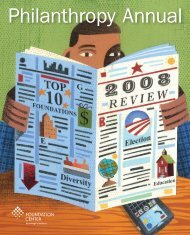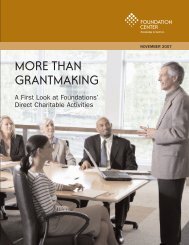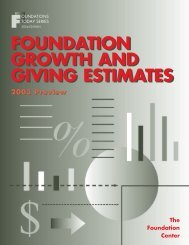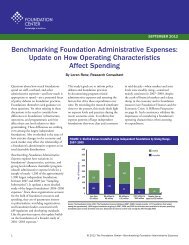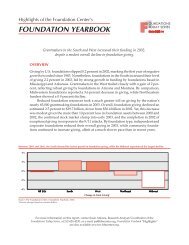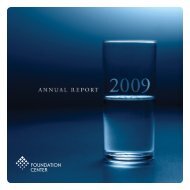Download Philanthropy Annual PDF - Foundation Center
Download Philanthropy Annual PDF - Foundation Center
Download Philanthropy Annual PDF - Foundation Center
You also want an ePaper? Increase the reach of your titles
YUMPU automatically turns print PDFs into web optimized ePapers that Google loves.
Book<br />
Reviews<br />
For PND’s “Off the Shelf” book reviews, visit:<br />
http://foundationcenter.org/pnd/offtheshelf/<br />
<strong>Philanthropy</strong> and <strong>Foundation</strong>s<br />
The Guide to Intelligent Giving: Make a Difference<br />
in the World — and in Your Own Life<br />
Joanna L. Krotz<br />
Hearst Books, 2009<br />
H<br />
igh-net-worth U.S. households are the target audience for the Guide to<br />
Intelligent Giving. The book addresses issues from the pros and cons of<br />
creating a family foundation and how to set one up, to engaging children<br />
in philanthropy and building a philanthropic legacy with them, to new ways of<br />
giving. The book’s topical format allows the reader to easily turn to a particular<br />
area of interest, such as the difference between charitable remainder trusts and<br />
charitable lead trusts, reasons for and costs associated with a donor consultant,<br />
forming a nonprofit corporation, and honing your nonprofit management skills.<br />
Other topics include joining a board, becoming a high-profile fundraiser, the<br />
advantages of long-term giving, the disadvantages of restricted gifts, and the<br />
pros and cons of establishing a foundation in perpetuity.<br />
Krotz scatters clarifying and thought-provoking questions throughout<br />
the book and includes sample forms for managing grant requests and site<br />
visits, as well as a chart comparing the various costs and tax implications of<br />
donor-advised funds, supporting organizations, and private foundations. In<br />
its last chapter, “Ways and Means,” Krotz has compiled a list of more than<br />
one hundred philanthropy advisors, donor education centers, foundation and<br />
family-giving advisors, watchdog groups, funder affinity groups, and relevant<br />
blogs. —Alice Garrard<br />
International Issues<br />
Globalization, <strong>Philanthropy</strong>, and Civil Society:<br />
Projecting Institutional Logics Abroad<br />
David C. Hammack, Steven Heydemann (eds.)<br />
Indiana University Press, 2009<br />
t a time when an emergent global civil society is advancing the idea of<br />
universal standards with respect to governance and accountability, one<br />
Aof the key questions about global philanthropy is when, how, or even<br />
whether foundations can be effective agents in strengthening civil society<br />
abroad. Taking a social sciences approach to the question, the editors of<br />
Globalization, <strong>Philanthropy</strong> and Civil Society present a range of case studies<br />
that illustrate how foundations and nongovernmental organizations project their<br />
“logics” — i.e., “models for the organization of civil society, foundations, advocacy,<br />
entrepreneurialism, and public health” — abroad and how such models<br />
are received by local nonprofits and communities.<br />
The ten chapters are informed by a series of big questions, such as: Do<br />
funders’ institutional models limit the effectiveness of local grantees engaged in<br />
building civil society? How are Western organizations implicated in patron-client<br />
relationships governing the distribution of resources and political power? And, how<br />
does culture affect a funder’s ability to adapt its strategies to local contexts?<br />
The book does not offer definitive answers to the myriad questions it raises.<br />
It does, however, offer diverse perspectives on topics ranging from attempts to<br />
import South Africa’s Truth and Reconciliation Commission as a model for transitional<br />
justice to the advocacy strategies of Greenpeace and Friends of the Earth<br />
in four different countries. For all the detail included in each chapter, Globalization,<br />
<strong>Philanthropy</strong> and Civil Society, like the many variations in the local contexts it<br />
examines, is a hodge-podge of ideas, arguments, and conclusions. Informative and<br />
provocative? Yes. The last word on the subject? No. —Kyoko Uchida<br />
Social Justice <strong>Philanthropy</strong><br />
A Philanthropic Covenant With Black America<br />
Rodney M. Jackson (ed.)<br />
John Wiley & Sons, 2009<br />
compilation of eight essays written by leaders within the African-<br />
American community, A Philanthropic Covenant With Black America<br />
Apaints a compelling picture of the realities of black life in America<br />
and argues that a renewed sense of philanthropy within black communities<br />
is vital to strengthening those communities. The book delves into<br />
many topics related to philanthropy within the black community, including<br />
the roles of religion, civic engagement and volunteerism in shaping<br />
black philanthropy; the important role of family and friends in black<br />
communities; and the African-American response to hurricanes Katrina<br />
and Rita. It addresses both micro and macro views of African-American<br />
philanthropy, with a particular emphasis on the role of the individual in<br />
the black community and a passionate belief that what is good for the<br />
African-American community is also beneficial — indeed, critical — to<br />
the overall health of American society.<br />
Don’t pass on A Philanthropic Covenant because you don’t consider<br />
yourself to be connected to or focused on the African-American community.<br />
Whether the topic is community fundraising, civic engagement, the<br />
development of children and youth as a volunteer resource, or the operation<br />
of an effective giving circle, the advice and multifaceted approach<br />
to philanthropy presented by the book’s contributors will benefit any individual<br />
— indeed, any nonprofit — looking to strengthen his or her cultural<br />
competency and philanthropic effectiveness. —Gillian Sciacca<br />
Management and Leadership<br />
You’ve Gotta Have Heart: Achieving a Purpose<br />
Beyond Profit in the Social Sector<br />
Cass Wheeler<br />
Amacom, 2009<br />
ass Wheeler, CEO of the American Heart Association 1997–2008,<br />
has penned a management book, and in it he addresses the hun-<br />
for charitable-minded business advice. The days of charities<br />
Cger<br />
as scrappy little institutions, muddling by on their wits and the kindness<br />
of strangers, are long gone, he says. Rather, he espouses a more pragmatic,<br />
clear-eyed view of what nonprofits need to do to succeed that<br />
entails adopting many tactics from the for-profit world.<br />
He offers advice on both the more regimented aspects of nonprofit<br />
work — business model development, branding, collaboration and<br />
partnerships — as well as the traditional nuts-and-bolts aspects of<br />
charity work — advocacy, volunteer management, developing a mission<br />
statement. He weaves his discussion of business-minded practicality<br />
and charitable-minded idealism into a presentation that does justice<br />
to both without slighting either. Throughout, Wheeler humanizes his<br />
advice and guidance with stories of lessons learned during his tenure<br />
at the American Heart Association.<br />
Plainspoken and straightforward, his words ring with pragmatism based<br />
on years of experience, success, and the occasional setback. And as he<br />
notes early on, anyone moved to pick up a book like this — whether she’s an<br />
executive, a board member, a staffer, or a volunteer — is, in their own way,<br />
already well on their way to being a nonprofit leader. —Tracy Kaufman<br />
54 | <strong>Philanthropy</strong> <strong>Annual</strong> 2009



